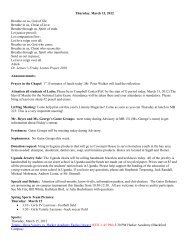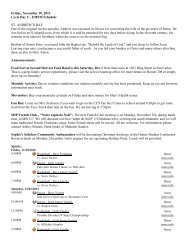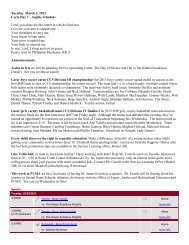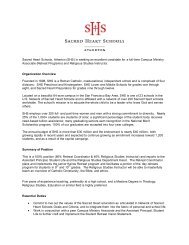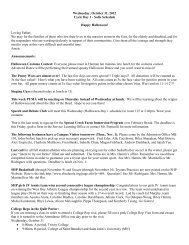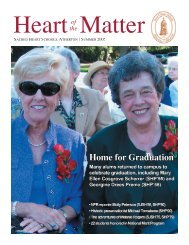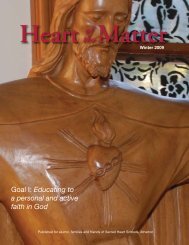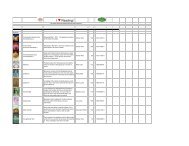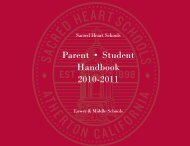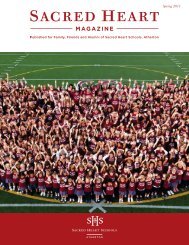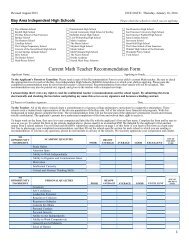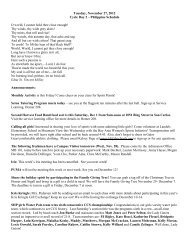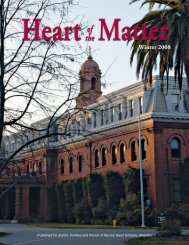Create successful ePaper yourself
Turn your PDF publications into a flip-book with our unique Google optimized e-Paper software.
<strong>Heart</strong> of the Alumni<br />
Facing AIDS<br />
For Jonny<br />
Dorsey<br />
(SJSH‘99,<br />
SHP‘03), a<br />
summer trip<br />
to Zambia<br />
was the<br />
beginning<br />
of a milliondollar<br />
campaign<br />
Anyone who knew him during his <strong>Sacred</strong> <strong>Heart</strong> days knows he<br />
is kindhearted, and a passionate leader. So you shouldnʼt be<br />
surprised to learn that after he spent a summer living in a Zambian<br />
refugee camp, he couldnʼt go back to life as he knew it. Instead,<br />
Jonny has launched a campaign called FACE AIDS to address the<br />
AIDS epidemic he saw firsthand in Africa.<br />
In 2003, after completing a St. Josephʼs and <strong>Sacred</strong> <strong>Heart</strong> Prep<br />
education with a Light Blue Ribbon, Jonny went to Stanford and<br />
followed his passion in the area of Human Biology, an interdisciplinary<br />
program that combines biology and health policy. His area<br />
of concentration is International Health and Infectious Disease.<br />
The summer after his sophomore year, Jonny traveled to Zambia<br />
with the FORGE program (Facilitating Opportunities for Refugee<br />
Growth and Empowerment). “I chose to work with FORGE<br />
because I thought their work was exciting, and also made good<br />
sense.” Jonny was in Mwange, in a camp of 23,000 refugees from<br />
the Congo. “These people came to Zambia with nothing,” said<br />
Jonny. “I developed a mentoring program for orphans, in which<br />
high school students served as mentors for elementary students.”<br />
Jonny and his two co-volunteers from Stanford were shocked<br />
to find that in the refugee camp, there were only 47 people who<br />
had tested positive for HIV, and that only 5 people were tested for<br />
the disease each month. “We couldnʼt believe so few people were<br />
getting tested, when national statistics suggested that at least 1000<br />
people in Mwange were living with HIV/AIDS.”<br />
“We also met Katele Henriette, the only semi-open HIV-positive<br />
person in the camp of 24,000 refugees, and began to work<br />
with her to convince more people to find out their HIV status.”<br />
Since then, the rate of testing has increased tenfold. Mama Katele<br />
(pictured above) spoke openly about her HIV status in a culture<br />
that generated great shame and stigma around the disease. Her<br />
willingness to share with Jonny and his colleagues helped them<br />
put a face to the great struggle of the HIV/AIDS crisis in Africa.<br />
When they focused on specific ways to help their friend Mama<br />
Katele, the focus of FACE AIDS began to take shape.<br />
One afternoon, the three students sat on the porch, talking about<br />
what they could do about AIDS in Zambia. No one wanted to<br />
go home and forget what they had learned. They decided they<br />
wanted to develop a small income-generating project that would<br />
encourage HIV testing and help families in the refugee camp have<br />
better lives.<br />
Jonny explained, “We learned that once a member of a family<br />
develops HIV, their ability to work stops and their children drop<br />
out of school and use desperate means to generate money for the<br />
family. However, if the person with HIV can generate a small income<br />
three things happen: 1) they will have more protein in their<br />
diet which will extend their life, 2) their children will be able to<br />
remain in school, and 3) when this income is developed through a<br />
small co-op, a support group is naturally formed.”<br />
“By the end of our porch discussion, weʼd all decided to take one<br />
year off from college and launch a campaign for student awareness<br />
and fundraising,” said Jonny. “Katie stayed in Zambia to organize<br />
co-ops of refugees to make beaded pins with the AIDS logo. These<br />
groups double as AIDS support groups. Lauren and I returned to<br />
California to distribute the pins and recruit more volunteers.”<br />
The plan: Distribute 50,000 pins in the next year, raising $1<br />
million. Then grant that $1 million to Partners in Health.<br />
“While I was in Zambia, I saw that how you give money away<br />
is extremely important,” said Jonny, “Many campaigns have been<br />
ineffective and have created more cultural stigma. I think that<br />
Partners in Health is the best organization treating HIV-positive<br />
patients in the developing world. They were the first to show that<br />
you could successfully provide ARVs in the developing world,<br />
and have since reformed WHO policy. They are just now moving<br />
into sub-Saharan Africa, and we want to speed up that process<br />
with our funding. We also want as many university students to<br />
understand their model as possible, and see that there are effective<br />
ways to treat AIDS in the developing world.”<br />
“We named the million-dollar fund the Katele fund, in honor<br />
of the woman who started it all,” said Jonny. “After living with<br />
AIDS for over four years, Mama Katele died on September 1,<br />
2005, just weeks before the United Nations brought anti-retroviral<br />
drugs (ARVs) to the refugee camp. The FACE AIDS campaign<br />
is dedicated to her memory.”<br />
“When we sell pins on college campuses, we tell the personal<br />
stories of people like Katele who made the pins,” said Jonny. “I<br />
think the personal stories make a big impact on college students<br />
when they are at a very impressionable age.”<br />
When reflecting back on his days at SJSH, Jonny remembers<br />
the “Sandwiches on Sundays” program, where he got to take food<br />
to serve at a church in Redwood City. “The one-on-one interactions<br />
with folks who needed food were very important,” said<br />
Jonny, “I think this experience helped me stay connected to my<br />
community, and compassionate, as I grew up.” The SJSH community<br />
service award was initiated that year, and Jonny was the<br />
first recipient.<br />
During his freshman year at SHP, Jonny traveled to Belize on<br />
a service immersion trip, where they worked on a seawall. “This<br />
trip was my first exposure to the developing world,” said Jonny,<br />
“Throughout high school I got to have personal relationships with<br />
people very different from myself, and it built my confidence in<br />
knowing that I could have an impact on someone elseʼs life.”<br />
Obviously, Jonnyʼs career in public service is far from over.<br />
We look forward to the great things to come.<br />
To learn more about Jonnyʼs work on the<br />
FACE AIDS campaign,<br />
please visit www.faceaids.org<br />
The <strong>Heart</strong> of the Matter 7



